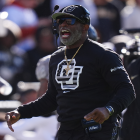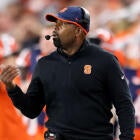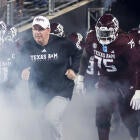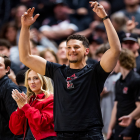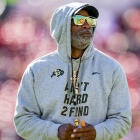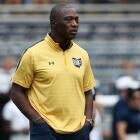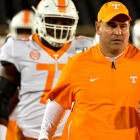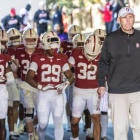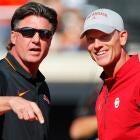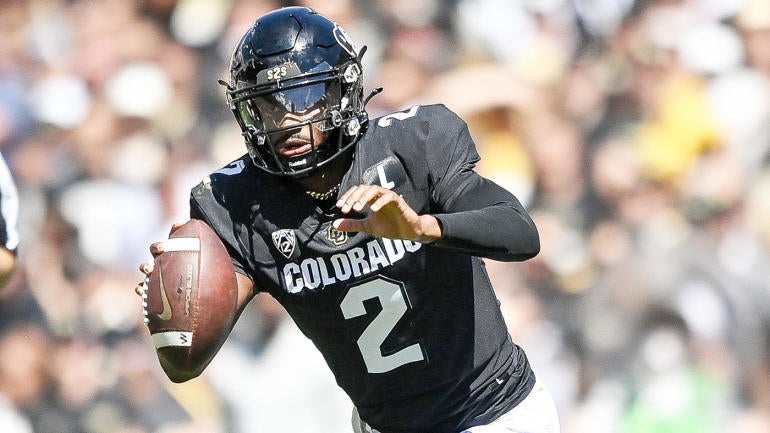
Colorado quarterback Shedeur Sanders drives a Maybach, a ride with a starting sticker price of $200,000. It's part of his NIL deal, which has been valued at $4.5 million.
That should matter these days only if you love luxury sleds or Sanders driving a luxury sled. On Saturdays? It shouldn't matter at all. In fact, it doesn't matter. Sanders is a Heisman Trophy candidate leading one of the biggest turnarounds in college football this season.
"The kid can flat out play," said his father, Colorado coach Deion Sanders. "I know a lot of people doubted him and said I just thrusted him in the starting position because of nepotism. All of you [who doubted] should look in the mirror and slap whatever you see."
A slap to the face is what college football is experiencing this season. It's time to wake up.
More than a third of the way through the season, thankfully, it has become all about the ball -- or at least more about ball. The sky-is-falling narrative regarding NIL and the transfer portal has largely been proven false and misleading. Talent distribution and player development has never been more equitable.
In fact, unprecedented earning power and player movement has helped give us what the status quo never could: parity. That's a good thing. That's a real thing, not just a coaching cliché used as an excuse after a big loss.
"Part of the commentary has revolved around the theory that the rich would get richer and the divide between the powerful institutions and those beneath would only widen," said South Florida-based sports attorney Darren Heitner. "That could not be further from the truth."
If the 12-team College Football Playoff field were in place right now, Fresno State would be in the field playing for a national championship. The SEC is down. The best league all season has been the soon-to-be late, great Pac-12. The conference that hasn't been to the CFP since 2016 is at least three deep in playoff candidates (USC, Oregon, Washington).
It is that way because the Pac-12 has more than capitalized on transfers.
Meanwhile, Georgia is a wobbly No. 1. The two-time reigning champions are tied for 95th nationally in sacks and are 78th in rushing. NIL and the portal have little to do with that. Mostly, those stats are key indicators how hard it is to win three in a row.
All of it contributes to the parity discussion. One-year turnarounds are not only common, they're demanded. Tulane went from 2-10 in 2021 to 12-2 in 2022. USC went from 4-8 to the Pac-12 Championship Game last season.
In one month of play, Colorado has gone from Power Five disaster to best story in the game.
The level of coaching and strategy has never been better. Nick Saban can't keep everyone on his coaching staff. In fact, Alabama under Saban has become a launching pad for some of the best and brightest coaches in the country. Distilled for this discussion: If Texas A&M wins Saturday, Jimbo Fisher would become the first Saban assistant to beat the master twice.
Elsewhere …
- Anyone noticing one of the best quarterbacks in the nation is playing at … Maryland? Tua Tagovailoa's brother, Taulia, leads the Big Ten in passing.
- In Year 12 and Game No. 133 of its FBS existence, Texas State upset Baylor on opening day for its first Power Five win. The Bears then scored 29 points in the last 18 minutes Saturday to beat UCF after being down 35-7.
- Georgia's eventual downfall might be simple attrition. The defense alone has lost 12 players combined in the last two NFL Drafts, seven in the first round. For the first time in seven years, the Dawgs have trailed by double digits in consecutive SEC games. Would anyone be that surprised if No. 20 Kentucky wins at Sanford Stadium this week? The Wildcats visit with a transfer running back, Ray Davis, who just ran all over Florida.
- Under Mark Stoops, those Wildcats have been ranked more times in the last five years of the AP Top 25 (32) than they were in the previous 60 years (31).
The enduring legacy of college sports is that athletes are pass throughs. There is no permanence. You get five years to play four. During that time, everyone has to figure it out -- coaches, athletes and commissioners.
"Adapt or die," Texas coach Steve Sarkisian said summarizing the modern era of talent acquisition.
Recruiting guardrails have been relaxed. This week, the NCAA Council quietly and permanently did away with scholarship limitations (25 high school recruits per year for FBS teams). Programs only need to stay at or below the overall 85-scholarship limit.
That sprinkles those talent seeds all over the game.
Sure, Shedeur Sanders followed his dad to CU. But he is still a transfer, and 57 others followed him to Colorado out of the portal for what is for now a transformational makeover.
"In reality, the existing structure entrenched certain programs in their positioning and made it incredibly difficult for a shift in the balance of power," Heitner said. "That is no longer the case in this new world of NIL coupled with the transfer portal."
There are no great teams six weeks into the 2023 season, but there's absolutely a bunch of good ones.
The biggest complaint of the playoff era is being addressed: The same old teams play for championships. In the last two years, Cincinnati and TCU have crashed the party, both since NIL debuted July 1, 2021.
The game has never been better. Last year, attendance was up for the first time in eight years. The year-over-year increase was the largest since 1982.
There are still 22 undefeated teams through five weeks of this season. That's six more than last year at the same point and the most after five weeks in 11 years.
Coach K's school, Duke, is ranked with a legitimate NFL prospect, Riley Leonard, at quarterback. A week ago, four "basketball schools" -- North Carolina, Kansas, Kentucky and Duke -- had yet to lose.
What that suggests is Sanders would be driving that Maybach even if his dad wasn't Coach Prime. Colorado is better because the quarterback is there, but he could be anywhere. Alabama recruited Sanders -- hard. Think how the Crimson Tide would look with him right now.
NIL revenue transfers as well.
"The combination of NIL and transfer portal is leading to a more even distribution of talent across college football," said Blake Lawrence, CEO of NIL clearinghouse Opendorse. "That's leading to more parity than ever."
Part of the conversation has revolved around the theory that the rich would get richer and the divide between the haves and have not would only widen. In significant cases, the opposite has happened. Athletic socialism has emerged with everyone sharing in the spoils -- if not entirely equally, more equally.
Who is going to win the SEC West? Alabama certainly isn't the old Alabama. Last year's division champion, LSU, has already lost twice (once in the SEC). It has the 117th ranked defense.
All of it -- the results, the record TV ratings, the attendance -- has made hypocrites out of the naysayers. For decades, the NCAA has warned in court arguments that players being compensated with anything beyond books, board, fees and tuition would ruin college sports.
Then Alston v. NCAA happened and everything changed.
The NCAA was too skittish to apply meaningful NIL rules. The market dictated the rest, and here we are. (The NCAA this week tried to get tough on NIL. More likely, it's much too late.)
"It's who has the most money," Colorado chancellor Phil DiStefano said. "I'd like everyone to be playing on the same level."
This from the campus CEO whose quarterback drives that Maybach. This from the program that has captured the attention of the nation.
Like his coach might say, Look in the mirror, Phil.
![[object Object] Logo](https://sportshub.cbsistatic.com/i/2020/04/22/e9ceb731-8b3f-4c60-98fe-090ab66a2997/screen-shot-2020-04-22-at-11-04-56-am.png)








